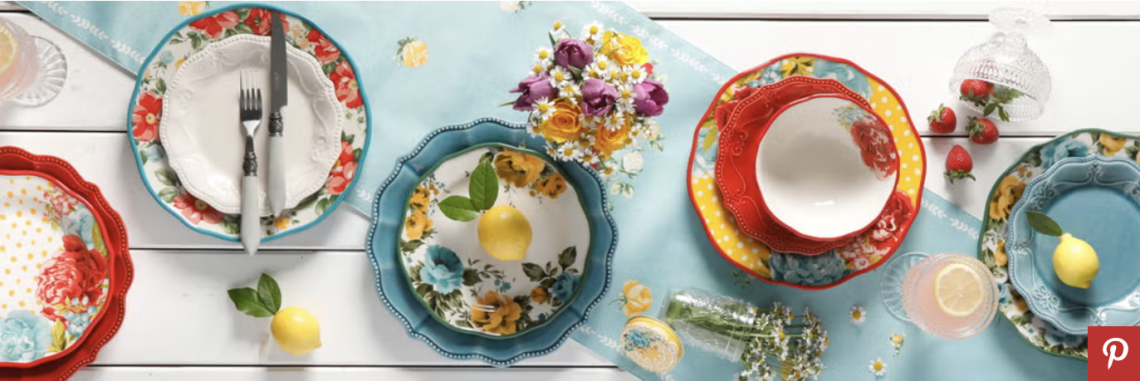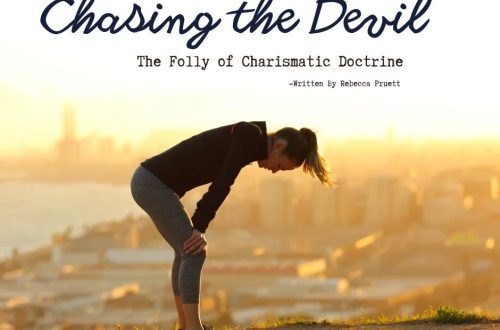
Pretty Dishes and Bad Theology
I bought a handful of Pioneer Woman kitchen items on clearance this week.
Honestly, I wrestled for a while before I could bring myself to do it.
It was one of those weird lingering tendrils of warped spirituality creeping in from yesteryears, messing with my head.
I kept putting them in my cart and pulling them out and putting them back in.
I kept thinking, Do I need these? No… Could I make do with 25-cent plastic cups and my faithful casserole dish with the broken handle? Of course. Is a daisy covered rolling pin necessary, when I could just use a basic wooden one? No…
But I like Pioneer Woman and it made sense to buy them.
I had been eyeing these very items for months, hoping they’d go on sale, and here they were—deeply discounted. If I was going to add these to my collection, now was the time to buy them!
But I felt guilty.
I felt guilty for wanting something because it was pretty.
Why did it feel wrong to buy something cheerful and colorful just because I liked it?
I couldn’t answer that question right away, so I had to work through it.
I’ve loved Pioneer Woman kitchenware from the very beginning. Before Ree Drummond was a household name, I followed her blog, drawn in by her wit, her self-deprecating humor (kindred spirit!), her recipes, and her candid chats about marriage, kids, and home life.
When her kitchen line first hit Walmart, I became an avid collector. The bright, cheerful florals made my kitchen feel cozy. Her beautiful pieces weren’t just practical—they inspired me. They were a reflection of a merry heart. It was a small, everyday joy to serve a casserole in a vintage floral dish or choose between heritage floral and country charm dinnerware. I was in my element putting pot pies in adorable miniature pie plates, and soups in whimsical single-serve Dutch ovens. These weren’t just things—they were reminders of home, family, and the kind of warmth I wanted to cultivate.
Over the years, my husband, kids, and loved ones gifted me Pioneer Woman pieces because they knew how much I loved them. I had an extensive array of dishes, dinnerware, and bakeware.
They were truly special to me.
But more than once, I got rid of my entire collection.
Just thinking about it brings a pang of regret.
I had to ask myself: Why did I do it? Why did I purge items from my life that I loved and treasured?
The answer was embarrassing.
Silly notions of godliness.
Silly notions of idolatry.
Silly notions of sacrifice.
Misguided teachings instilled in my mind that if you like something even a little, it must be an idol.
That real spirituality meant being willing to give up everything.
I didn’t know it then, but that’s not what Scripture teaches. Colossians 2:20-23 warns against self-made religion and the belief that holiness is found in strict rules and unnecessary deprivation:
“If with Christ you died to the elemental spirits of the world, why, as if you were still alive in the world, do you submit to regulations—‘Do not handle, Do not taste, Do not touch’ (referring to things that all perish as they are used)—according to human precepts and teachings? These have indeed an appearance of wisdom in promoting self-made religion and asceticism and severity to the body, but they are of no value in stopping the indulgence of the flesh.”
Asceticism—the belief that the less you enjoy, the holier you are—isn’t biblical. It may look spiritual, but Paul says it’s worthless in truly restraining sin.
When ‘holiness’ is measured by how much you are willing to give up, ‘spiritual maturity’ looks like a monumental surrender of everything.
So I did.
Not just my Pioneer Woman collection.
I gave away my wedding dress. My children’s baby items. Boxes of letters. Things my mom made for me. Pictures and decorations I adored. Treasured furniture pieces I worked hard to acquire. A lifetime of little things that make a home feel like a home.
Basically, if it had sentimental, earthly value and meant anything to me, I got rid of it.
I couldn’t have anything tying me to this world.
I was the master of self-denial.
A master of starting and living from scratch.
At the time, I thought I was proving something to God.
Looking back, it was just unnecessary.
What a comfort it has been to find clarity in Scripture!
Philippians 3:8-9 makes it clear that our righteousness isn’t found in what we give up but in Christ alone:
“Indeed, I count everything as loss because of the surpassing worth of knowing Christ Jesus my Lord. For his sake I have suffered the loss of all things and count them as rubbish, in order that I may gain Christ and be found in him, not having a righteousness of my own that comes from the law, but that which comes through faith in Christ, the righteousness from God that depends on faith.”
How badly I wish someone had taken me aside and told me that there was nothing sinful about owning things that mattered to me!
Somewhere along the way, happiness started to feel like a sin.
Enjoying things—really enjoying them—felt wrong. If something made me happy, I second-guessed it. If something brought me joy, I questioned whether I should feel that way. I remember feeling “convicted” eating a small chocolate one time and then praying devotedly that God would bring me to a willingness to surrender chocolate once and for all. I remember the first time we bought a house. On one hand, it was a dream come true. It was everything I ever wanted! But on the other, it gave me awful anxiety because we had been influenced to believe that owning property was “less spiritual.” How could we live with ourselves?
Everything had to be measured, examined, and held at arm’s length. A pretty dish? A distraction. A sentimental keepsake? Too attached. A vacation? Too self-indulgent. I had been conditioned to believe that if I got too comfortable with the tangible and the temporal, I was slipping spiritually.
But Galatians 3:3 reminds us that holiness isn’t something we achieve through self-denial or rigid discipline:
“Are you so foolish? Having begun by the Spirit, are you now being perfected by the flesh?”
I spent years believing that godliness meant rejecting myself—my interests, my personality, the things that made me me. That I should reject anything the moment I valued it, as if appreciation itself was a step toward idolatry. That a truly faithful person wouldn’t care about possessions or sentimental things.
The more I erased myself, the more I thought I was proving something to God.
How silly I was to imagine these efforts made me spiritual or increased my godliness!
Galatians 2:21 reminds us:
“I do not nullify the grace of God, for if righteousness were through the law, then Christ died for no purpose.”
If self-denial could make me holy, I wouldn’t need Christ. But my righteousness isn’t in what I give up—it’s in Him.
God never commanded me to strip my life of every good and meaningful thing to prove my devotion. Scripture doesn’t call us to asceticism or self-inflicted deprivation as a measure of holiness. That was a burden imposed by false teaching—a distorted view of faith that treated joy with suspicion and saw lawful enjoyment as a threat to godliness.
After wrestling over my cart of Pioneer Woman for nearly a week, I received a package in the mail.
My mom sent me a doily she crocheted, along with a handwritten note.
A treasure. Something from her that I could keep forever.
I thought again of all the treasures I foolishly relinquished in the past.
I held the little doily against my chest and for a moment, I just sat with it—letting the weight of what I once believed about ‘things’ settle against the reality of what I know now.
I can keep this.
I’m allowed to keep this.
I don’t have to prove my devotion to God by self-imposed deprivation.
I don’t have to measure my faith by how much I can live without.
Faithfulness was never meant to be a life stripped of everything meaningful, as if enjoyment and devotion couldn’t coexist.
I was reminded of 2 Corinthians 5:21. Our righteousness is not found in what we give up, but in Christ alone:
“For our sake he made him to be sin who knew no sin, so that in him we might become the righteousness of God.”
So I laid my mother’s doily across an end table where I could see and enjoy it every day, I tucked her note in my Bible and—
I bought the Pioneer Woman dishes.
Not just one or two—I bought several.
I decided it was time to start rebuilding my collection.
Not because I have some restless, frivolous attachment to earthly things.
But because I like the dishes.
Because they bring me joy.
Because my hope isn’t in what I own or what I give up—my hope is in Christ, whose righteousness is mine apart from works.





